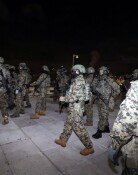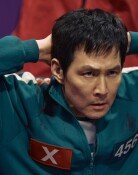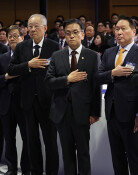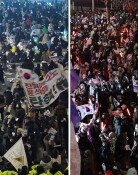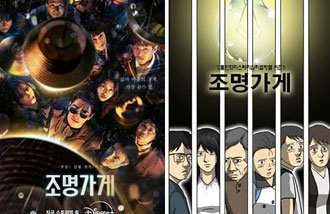German Chancellor Merkel receives Seoul Peace Prize
German Chancellor Merkel receives Seoul Peace Prize
Posted November. 04, 2016 07:11,
Updated November. 04, 2016 08:56
German Chancellor Angela Merkel received the plaque of the Seoul Peace Prize and prize money amounting to 200,000 U.S. dollars at her office in Berlin, Germany on Wednesday.
“I think it is a great gift for Germany and Europe, which is awarded for the efforts made to achieve reconciliation and mutual understanding between Germany and neighboring countries and with Israel,” Merkel said in her speech after receiving the prize. “The leadership in North Korea has continued provocations toward the international community with nuclear tests and missile launches, violating international law, posing threat to neighboring countries for years. I hope that the Korean people achieve their dream of national reunification.”
The Seoul Peace Prize Cultural Foundation named Chancellor Merkel as the winner of the 12th Seoul Peace Prize in September 2014. Merkel said at the time that she would receive the prize in Seoul in person, but she has had no schedule to visit Seoul and more than two years has passed since. As a result, the German leader asked the foundation to give special consideration, and the award ceremony took place in Germany belatedly.
When announcing Merkel as the winner of the prestigious award two years ago, the foundation said, “She repeatedly made apologies for Holocaust committed by Germany during the Second World War, and sent an alarm to countries that deny past atrocities, and nations currently under dictatorship that abuse or violate human rights,” in explaining the reason for choosing the German leader as winner.
When delivering a speech at the Israeli parliament for the first time as a German chancellor in March 2008, Merkel made a deep apology by saying that Holocaust is the biggest shame for Germans. In 2013, she became the first German Chancellor to visit the Dachau Nazi Concentration Camp that had left more than 43,000 people killed. During the visit, the German chancellor recalled the fate of those detainees by saying that she felt deep sadness and shame and most Germans turned a blind eye to the massacre at the time, adding that warnings at this place would remain forever.
The Seoul Peace Prize is awarded every other year since it was instated to commemorate Korea’s successful hosting of the Summer Olympics in 1988. Juan Antonio Samaranch, then chairman of the International Olympic Committee, was the first winner of the prize in 1990. Winners include former U.S. Secretary of State George Shultz, Doctors without Border, and the U.K.-based aid agency Oxfam. U.N. Secretary-General Ban Ki-moon was the first Korean to receive the prize in 2012.
Jung-Min Dong ditto@donga.com



